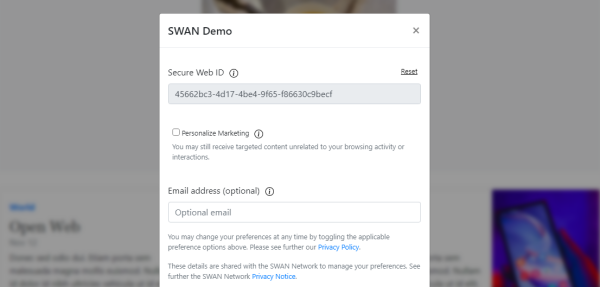
A group of tech and legal experts have come together to create a non-profit alternative to Google’s Privacy Sandbox following the phasing out of cookies.
The group says its Secure Web Addressability Network (SWAN) offers an alternative as Google plans to phase out third-party cookies on its dominant chrome browser.
Google wants to replace cookies with its Sandbox technology which would still enable advertisers to target particular website users with marketing. But some marketers fear Google taking control of the personalisation technology which underlines most online advertising would enable it to increase its already huge dominance of the digital advertising market.
Users who visit publishers signed up to the SWAN, which is aiming to be operational this summer, will only be asked to consent to personalised marketing once – with their choice then carrying over to all the other websites involved.
 Read New Statesman Media Group’s free white paper: How to define, discover and develop actionable leads in B2B marketing
Read New Statesman Media Group’s free white paper: How to define, discover and develop actionable leads in B2B marketing
With that privacy message publishers would be able, if they choose, to explain to their readers why personalised ads help them make money and fund more journalists – where at the moment this value exchange is never explained.
A unique identifier enables the personalisation, if opted in, to be shared without the use of third-party cookies. Users will also be able to more easily tell websites if there are particular adverts they are uninterested in – which could mean publishers can better make the most of their ad slots and make more money.
[Read more: How Google is building an internet without cookies – and why publishers are concerned]
James Rosewell, a founder member of SWAN and chief executive of data services company 51 Degrees, urged publishers to “think differently” and engage with the project because it “fundamentally changes the premise of the debate that’s happening”.
He said there was “even an opportunity that publishers will start to reduce the number of adverts on the page because they can earn more money for fewer adverts”.
Rosewell told Press Gazette: “We think it helps people because it gives meaningful control over privacy, talks to them in language they can understand and it stops hassling them over and over again, because if you just keep shouting at someone over and over again they’re hardly going to provide you with a rational answer.”
Rosewell, who is also director of the Marketers for an Open Web group, added: “The next step is with publishers – are they going to step up and embrace the solutions being really well thought through for them so that they can continue?
“I’m doing this because I want my kids to have an open web – I want them to access a plurality of publishers and I want them if they want to be engineers to work for a company that’s not a monopoly based in Silicon Valley, I want them to have the option of working for lots of smaller or medium sized companies.”
Google is currently preparing to phase out third-party cookies on its Chrome browser to better protect its users’ privacy.
But its alternative Privacy Sandbox plan is being investigated by the UK’s Competition and Markets Authority after publishers complained the tech giant is “abusing its dominant position”.
[Read more: Magazine publisher Future backs Google despite ban on ‘alternative identifiers’ post cookies]
Google’s own research in 2019 found that disabling third-party cookies would result in an average revenue decline of 52% from programmatic advertising for publishers.
Rosewell has estimated that in a “best case” scenario publishers will receive 80% of their current cookie-enabled ad revenue through Google’s replacement FLoC (federated learning of cohorts) technology, which groups users who have similar browsing behaviours and essentially hides individuals within a crowd.
Google previously said FLoC would help publishers retain 95% of cookie-based ad revenue but has seemingly since clarified this was based on a different experiment to the algorithm that will be in place.
Rosewell said: “For some people, given the state of the industry, that sort of 20% is the difference between survival or not.”
[Sign up here for Press Gazette’s fortnightly newsletter Marketing Matters]
‘Commercial capitalist hats put to one side’
He said SWAN’s offering would be particularly beneficial for small to medium publishers and those with a large number of brands in their ownership – citing Reach, JPI Media, Conde Nast and Hearst as examples. He added it could also work well for major publishers without a reliance on a first-party logged in strategy, such as Daily Mail and General Trust.
Rosewell said: “We’ve had to put, to a certain extent, our commercial capitalist hats to one side and say ‘okay how do we create this community and what features does it have to have?’
“It’s a not for profit organisation that enables multiple organisations to operate against a common set of standards to deliver the services that you see in SWAN, and it’s structured in such a way so that you can never have a dominant company like a Facebook or a Google, again, for the pure and singular purpose of capturing a consent preference privacy choice, and providing identifiers that go alongside that preference. That’s all it does. It does nothing more than that.”

SWAN demo
SWAN is running a consultation and a series of webinars until the end of May. Publishers are being particularly urged to look at the standard set of terms and conditions that has been created to check it meets their industry “best practice” requirements.
Subject to the feedback received, it would then be made operational in time for parallel trials to take place in August while third-party cookies still exist in Chrome, before being fully relied upon by the end of September.
Rosewell said SWAN’s motivation is to “preserve society’s ability to run and provide a free press and open web – currently enabled in a large part by online advertising – which would be severely jeopardised by a Google monopoly”.
Google has said it is confident that proposals to scrap third-party cookies are right for the web despite questions about the potential impact on sites dependent on them for revenue.
Chetna Bindra, Google’s group product manager of user trust and privacy, said in January: “Thanks to the initial FLoC results, ongoing development of the APIs and encouraging dialogue with the industry, we are more confident than ever that the Privacy Sandbox is the best path forward to improve privacy for web users while ensuring publishers can earn what they need to fund great content and advertisers can reach the right people for their products.”
Picture: Shutterstock
Email pged@pressgazette.co.uk to point out mistakes, provide story tips or send in a letter for publication on our "Letters Page" blog
